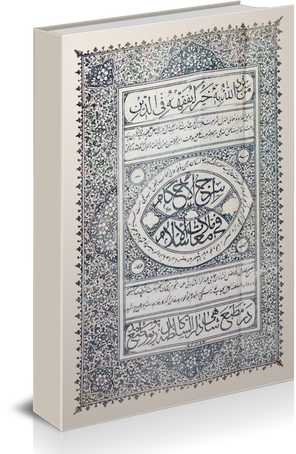
|
Sirāj al-aḥkām fi muˆāmalāt-i Islām (The Lamp of Rulings in the Transactions of Islam)
April 17, 2024
Sirāj al-aḥkām fi muˆāmalāt-i Islām (The Lamp of Rulings in the Transactions of Islam) is an authoritative and historical legal text within the Hanafi school of Islamic jurisprudence. Authored by Mir Ali Jan Khan, Abdul Razzaq, and Mohammad Sarwar Khan, it was published in 1909 by the Royal Printing Press in Kabul, Afghanistan. This comprehensive work addresses diverse matters of Islamic law with a primary focus on commercial transactions, contracts, inheritance, and related areas. The book delves into the principles and detailed rulings governing these aspects of Muslim life, providing intricate guidance for proper conduct in economic and social interactions, all based on the principles of the Quran and the Sunnah.
Download:
English |
Dari |
Pashto |
Arabic
|
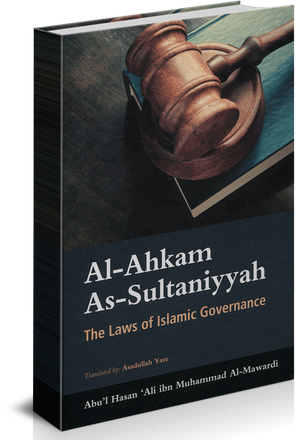
|
Al-Ahkam al-Sultaniyyah ("The Laws of Islamic Governance")
April 04, 2024
Al-Ahkam al-Sultaniyyah ("The Laws of Islamic Governance") is a foundational work of Islamic political thought authored by the prominent 11th-century scholar and jurist Abu al-Hasan al-Mawardi. This treatise profoundly shaped Islamic governance by addressing the principles of leadership, the structure of government, the administration of justice, and the relationship between the ruler and the ruled within the framework of Sharia (Islamic law). Al-Ahkam al-Sultaniyyah remains a highly influential text within Islamic political philosophy, offering valuable insights into the interplay between religious law and the practical realities of statecraft.
|
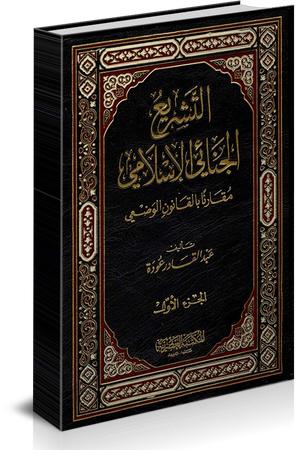
|
The Islamic Criminal Legislation Compared to Positive Law
March 24, 2024
The Islamic Criminal Legislation Compared to Positive Law" (التشريع الجنائي الاسلامی مقارنا بالقانون الوضعي) by Abd al-Qadir 'Audah is a comparative law study. It examines Islamic criminal law in relation to modern legal systems ("positive law"). The book explores similarities and differences between these two legal frameworks, offering insights into Islamic perspectives on crime, punishment, and principles of justice. It is likely a valuable resource for those interested in Islamic law, comparative law, or the study of criminal justice systems.
Download:
English |
Dari |
Pashto |
Arabic
|
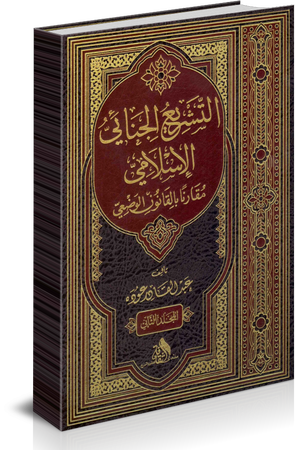
|
The Islamic Criminal Legislation Compared to Positive Law – Second Volume
March 24, 2024
The Islamic Criminal Legislation Compared to Positive Law" (التشريع الجنائي الاسلامی مقارنا بالقانون الوضعي) by Abd al-Qadir 'Audah is a comparative law study. It examines Islamic criminal law in relation to modern legal systems ("positive law"). The book explores similarities and differences between these two legal frameworks, offering insights into Islamic perspectives on crime, punishment, and principles of justice. It is likely a valuable resource for those interested in Islamic law, comparative law, or the study of criminal justice systems.
Download:
English |
Dari |
Pashto |
Arabic
|
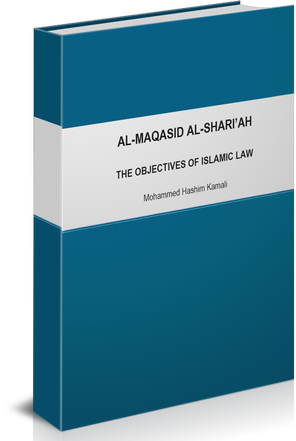
|
Al-Maqasid al-Shariah: The Objectives of Islamic Law
March 18, 2024
Al-Maqasid al-Shari'ah - The Objectives of Islamic Law" by Professor Mohammad Hashim Kamali is a fundamental work that looks into the goals and reasons behind Islamic law. Professor Kamali discusses maqasid al-shari'ah, pointing out main aims like protecting religion, life, mind, family, and property. This book shows how Islamic scholars use these goals to come up with new legal decisions and handle modern issues. "Al-Maqasid al-Shari'ah" is key for anyone wanting to get the philosophy behind Islamic law and its ability to adapt to changing times.
|
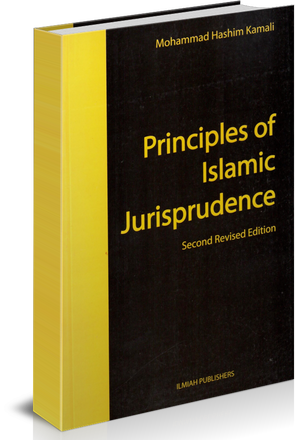
|
Principles of Islamic Jurisprudence
March 18, 2024
Principles of Islamic Jurisprudence" by Mohammad Hashim Kamali is a highly regarded academic work exploring the foundations of Islamic law (usul al-fiqh). It provides a detailed examination of how Islamic legal rulings are derived from primary sources like the Quran and the Sunnah (teachings of the Prophet Muhammad). Kamali offers a comprehensive overview of the methodologies and principles employed by different Islamic schools of thought, making the work accessible to students and scholars alike. "Principles of Islamic Jurisprudence" holds significance for anyone interested in the theory of Islamic law, its historical development, and its relevance in contemporary contexts.
|
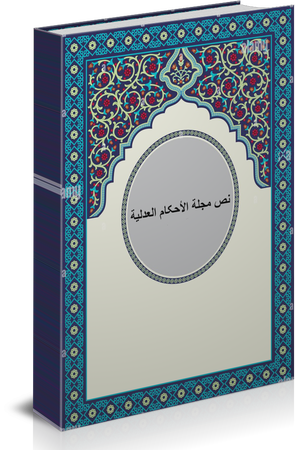
|
The Ottoman Courts Manual (Hanafi)
March 13, 2024
The Majallah, or Al-Majalla Al Ahkam Al Adaliyyah, is an essential legal document originating from the Ottoman Empire, based on the Hanafi school of Islamic jurisprudence. Its adoption in the late 19th century marked a significant codification of Islamic civil law, covering a wide array of subjects such as contracts, property rights, and family law. Its structured composition and adherence to Hanafi principles made it a cornerstone for judicial processes within the Ottoman territories and beyond. In contemporary Afghanistan, the Majallah has gained renewed importance.
|
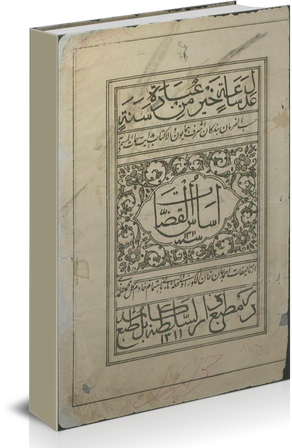
|
Asās al-Quz̤āt
March 13, 2024
Asās al-Quz̤āt, or “The Basis for Judges,” is a significant 19th-century work on Islamic jurisprudence published by the royal press in Kabul, Afghanistan. Intended as a comprehensive guide for judges applying Islamic law, the book focuses on the principles of the Hanafi school of thought, one of the four major Sunni Islamic legal traditions. Its creation reflects the Afghan monarchy’s efforts to codify and integrate Islamic legal principles into the state’s judicial system. Asās al-Quz̤āt remains a valuable resource for scholars and practitioners interested in understanding how Islamic legal traditions have historically been applied within the Afghan legal system.
Download:
English |
Dari |
Pashto |
Arabic
|
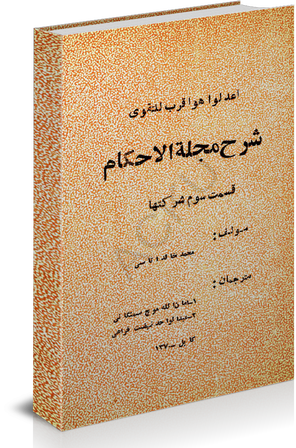
|
Volume 3: Commentary on Majalla al-Ahkam, Section on Companies
March 21, 1991
Mohammad Khalid Atasi's analysis (translated by Amanullah Mawj Samangani and Abdulwahed Nahzat Farahi, with Qadriya Yasini's oversight) investigates the Majalla's perspective on company and commercial law. This book examines how Islamic law addresses the formation, operation, and legal standing of companies. It is an essential guide for legal practitioners, business professionals, and scholars interested in how Islamic jurisprudence intersects with corporate law.
Download:
English |
Dari |
Pashto |
Arabic
|
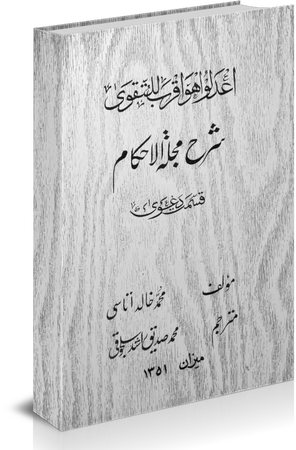
|
Volume 1: Commentary on Majalla al-Ahkam, Section of Lawsuit
September 23, 1972
Mohammad Khalid Atasi's commentary, expertly translated into Farsi by Mohammad Siddiq Rashid Saljooqi, provides a detailed analysis of the Majalla's treatment of lawsuits and disputes. The Majalla, a civil code rooted in Hanafi Islamic law, governs commercial and civil matters. This book elucidates complex legal concepts, making it essential for understanding the principles of Islamic law and their application within legal contexts. Ideal for scholars, legal practitioners, and anyone interested in the intersection of Islamic law and contemporary legal systems.
Download:
English |
Dari |
Pashto |
Arabic
|
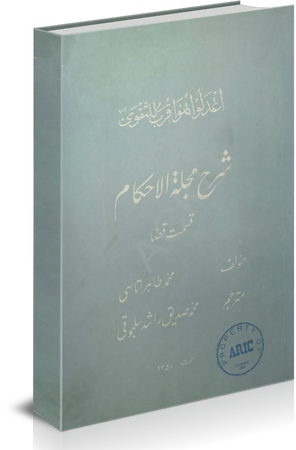
|
Volume 2: Commentary on Majalla al-Ahkam, Section of Judgment
February 20, 1972
Mohammad Taher Atasi's work, translated into Farsi by Mohammad Siddiq Rashid Saljooqi, offers in-depth insights into the Majalla's approach to judicial rulings. This book focuses on Islamic legal processes and the principles of Hanafi jurisprudence concerning court decisions. It provides clear explanations of Islamic court proceedings, offering a valuable resource for students, legal professionals, and those interested in the foundations of Islamic legal traditions.
Download:
English |
Dari |
Pashto |
Arabic
|
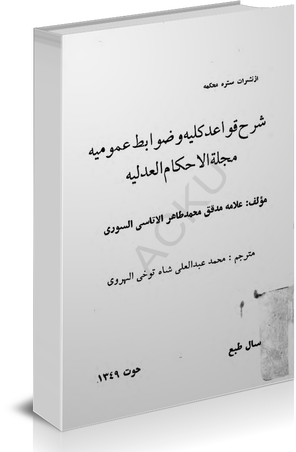
|
Volume 4: Commentary on the General Rules and Universal Principles of the Majalla al-Ahkam al-Adliya
February 20, 1971
Mohammad Taher Atasi's work, translated into Farsi by Mohammad Abdul Ali Shah Tukhi al-Herawi, explores the fundamental concepts and rules underpinning the Majalla. This book offers a comprehensive understanding of Islamic legal theory, focusing on the principles of justice and fairness. It serves as a crucial resource for anyone studying or practicing law in contexts influenced by Islamic jurisprudence and for those interested in the foundations of Islamic legal systems.
Download:
English |
Dari |
Pashto |
Arabic
|











